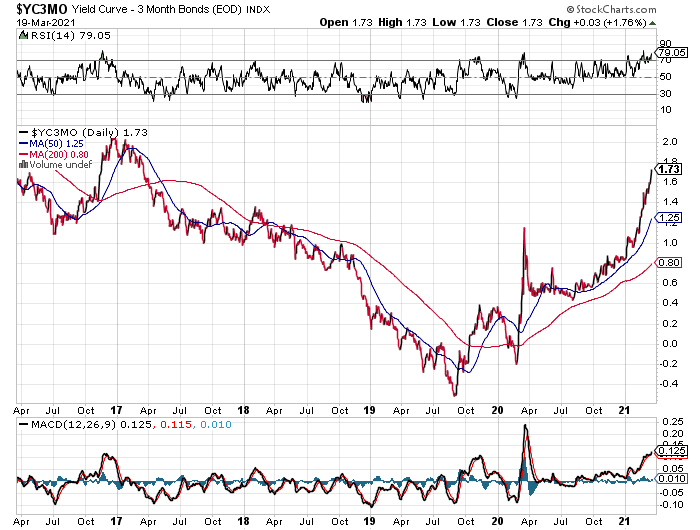Shares in the energy patch continue post the strongest year-to-date performance for US equity sectors, based on a set of exchange traded funds through yesterday’s close (Mar. 23). The dramatic bounce from last year’s low has left the rest of the sector field in the dust in 2021. But some of the laggards are showing relative strength in recent weeks, suggesting that a leadership rotation may be brewing.
Macro Briefing: 24 March 2021
* White House to talk with Mexico, Guatemala after migrant surge at border
* N. Korea’s missile launch ‘not provocation,’ says Biden
* EU drafts law to severely cut vaccine exports for six months
* Will stimulus package fuel inflation? Modestly, at most, predicts Fed’s Powell
* Bookings for summer travel season are heating up
* Eurozone economy expands in March — first growth in 6 months via PMI data
* UK economy rebounds, posting strongest growth in 7 months via PMI data
* Richmond Fed Mfg Index posts stronger growth in March
* New US home sales fell to a 9-month low in February:
Core Inflation Is Probably A Better Measure Of The Trend
Inflation is topical again. The crowd is becoming increasingly concerned that a combination of factors, including ramped-up fiscal spending and ongoing monetary stimulus, will conspire to unleash firmer pricing pressure. By some accounts, inflation is set to spiral higher and threaten the price stability that’s prevailed for several decades.
Macro Briefing: 23 March 2021
* Gunman kills 10 in a mass shooting at a grocery store in Colorado
* US officials raise new questions over AstraZeneca vaccine trial results
* White House working on $3 trillion infrastructure proposal
* Will rising EU-China tensions derail new investment deal?
* Lessons from 2010-2011 inflation scare are relevant again
* UK jobless rate unexpectedly fell over three months through January
* Federal Reserve won’t issue a digital currency without congressional approval
* Existing home sales down sharply in Feb due to drop in supply
* US economy contracted in Feb via Chicago Fed Nat’l Activity Index:
Foreign Property Shares Led Markets By Wide Margin Last Week
Amid flat-to-negative performances for most of the major asset classes, last week’s strong rally in real estate stocks ex-US stands out. This corner of global markets led by a wide margin, based on a set of ETFs through the close of the trading week on Friday, Mar. 19.
Macro Briefing: 22 March 2021
* AstraZeneca vaccine: 79% effective in US study, no higher risk of blood clots
* Homeland Security Secretary says US’ border with Mexico is ‘closed’
* Will US suffer another Covid-19 surge? Unclear, say experts
* Canadian Pacific Railway on Sunday to buy Kansas City Southern for $25 billion
* A Fed with no fear of inflation is a risk factor
* US economy on ‘brink’ of complete recovery, says Richmond Fed’s Barkin
* US stimulus package will boost global economy too, analysts predict
* Turkey’s currency crashes after President fires country’s central bank governor
* 10yr/3mo US Treasury yield curve at 1.73 percentage points, a four-year high:
The ETF Portfolio Strategist: 21 March 2021
Last week’s downside bias in global markets pinched our two proprietary strategies, which fell in line with their strategy benchmarks. Both active strategies, which follow a set of quantitative rules, are still posting year-to-date gains, but their performances trail the benchmark.
Book Bits: 20 March 2021
 ● Genius Makers: The Mavericks Who Brought AI to Google, Facebook, and the World
● Genius Makers: The Mavericks Who Brought AI to Google, Facebook, and the World
Cade Metz
Q&A with author via The News & Observer
With his new book, “Genius Makers: The Mavericks Who Brought AI to Google, Facebook, and the World,” Metz is sharing the stories of the individuals whose breakthroughs in the past decades have pushed forward the limits of artificial intelligence.
As a reporter for Wired Magazine and now the Times, Metz has had a front row seat to the incredible strides made in deep learning, a process in which a computer learns from absorbing large amounts of data. That has helped computer programs make huge leaps in things like facial recognition and self-driving cars, and fueled intense competition between companies, like Google, Microsoft, Facebook and multiple Chinese firms.
The ETF Portfolio Strategist: 20 March 2021
In this issue:
- Asia stocks, led by Japan, rallied this week
- Portfolio strategy benchmarks retreated for the trading week
Research Review | 19 March 2021 | Forecasting
Predictable Financial Crises
Robin Greenwood (Harvard University), et al.
March 2021
Using historical data on post-war financial crises around the world, we show that crises are substantially predictable. The combination of rapid credit and asset price growth over the prior three years, whether in the nonfinancial business or the household sector, is associated with about a 40% probability of entering a financial crisis within the next three years. This compares with a roughly 7% probability in normal times, when neither credit nor asset price growth has been elevated. Our evidence cuts against the view that financial crises are unpredictable “bolts from the sky” and points toward the Kindleberger-Minsky view that crises are the byproduct of predictable, boom-bust credit cycles. The predictability we document favors macro-financial policies that “lean against the wind” of credit market booms.



